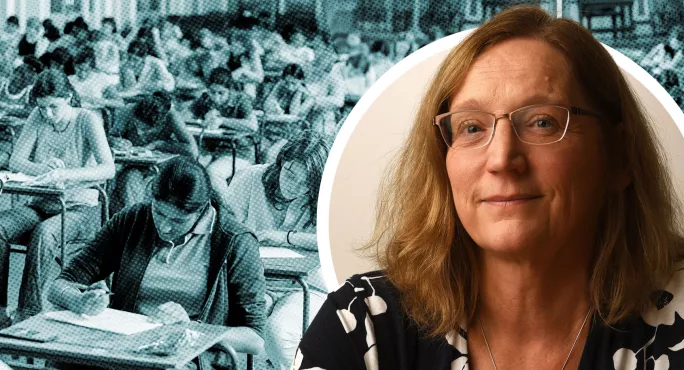
Cut GCSE exam papers to boost wellbeing, suggests OCR chief

The chief executive of exam board OCR has suggested that all GCSEs should be limited to two exam papers lasting no longer than 90 minutes each, in a bid to boost student wellbeing.
Jill Duffy was speaking earlier this week at an on the curriculum and assessment review.
She said that âwe could reduce that level of assessment without impacting on reliability or impacting on standardsâ and that the move âcould have a positive impact on wellbeingâ.
âA concrete thing you could do at GCSE would be to say that each GCSE could have a maximum of two papers - a lot of them have three at the moment - and those two papers could be a maximum of 90 minutes,â she added.
âIf you did that, you would reduce the exam burden, on average, by about eight to 10 hours. And you could do that without reducing the reliability of exams,â she said.
Ms Duffy, who will be replaced as CEO in September by Myles McGinley, OCRâs responsible officer and director of regulation, added: âI think we have got too much assessment, too many exams going on at 16âŠIf you look at England, at the moment, on average, a student is taking 30 hours of exams. That is far more than almost every other country.â
âBare minimumâ
OCR has previously called for a reduction in the number of assessments and curriculum content covered by GCSEs.
But a section in OCRâs , chaired by former education secretary Charles Clarke and released in September 2024, acknowledges that cutting down exam papers could be seen as problematic.
The report stated that during OCRâs âdiscussions with our research colleagues in Cambridge University Press & Assessmentâ, the view was expressed that âa single 90-minute exam for each GCSE subject would be the absolute bare minimum to stay respectableâ in terms of reliability.
It added that 90-minute exams âwouldnât allow all the content that is assessed at the moment to be includedâ.
The most assessed system in the world?
Accompanying Ms Duffy on the panel was Tim Oates, group director of assessment research and development at Cambridge University Press & Assessment, and one of the architects of the 2014 national curriculum.
Mr Oates said: âIâm going to challenge the idea that weâre the most assessed system in the world. Weâre not and Iâve studied a large number of systems.â
He continued: âAmerica, for example, [has] very high levels of standardised testing and also the implications of the outcomes of those tests [is] felt quite hard.
â[In] FinlandâŠthey do a lot of testing in primary and they do a lot of testing of the lowest attainers. They test the low attainers because theyâre really worried about them and want to understand what theyâre struggling withâŠso they can better support them.â
Coursework, AI and plagiarism
Among the suggestions to address exam overload and anxiety is increasing the amount of coursework in exams, a point supported by OCR and which Ms Duffy again supported in her testimony in Parliament.
âI think there absolutely are opportunities to look atâŠthe balance of coursework and exam,â she said.
Ms Duffy cautioned, though, that coursework has the additional âissue of AIâ and argued that it is something âwe need to face intoâŠAI isnât going to go back into its box; students are going to be using itâ.
She added: âI think in the future itâs going to be a case not of âdid you use AI?â but âhow did you use AI in this piece of coursework?â
âSo, it might be acceptable to use it, for example, for initial research but not to be passing off AI-generated coursework as your own work - that will be plagiarism and weâd deal with it severely, as we do any other forms of plagiarism.â
âDifferent basket of stressâ
However, on a potential increase in coursework, Mr Oates noted that although there is a âhuge volume of research on stress and examsâ, there is an âalmost [total] absence of research on stress and courseworkâ.
He explained that while it is a different type of stress, âwhen we look at the few studies that there have been of 16-year-olds and 18-year-olds, where the coursework goes up in volume, when it gets beyond a certain point, the stress really kicks in. They talk about deadlines all falling at the same time, the difficulty of completing things in diverse subjects.â
âSo, weâve got to understand that any form of assessment, whether itâs coursework or exams, comes with its own but different basket of stresses and pressure,â he said.
Want to keep reading for free?
Register with Tes and you can read five free articles every month, plus you'll have access to our range of award-winning newsletters.
Register with Tes and you can read five free articles every month, plus you'll have access to our range of award-winning newsletters.
Keep reading for just ÂŁ4.90 per month
You've reached your limit of free articles this month. Subscribe for ÂŁ4.90 per month for three months and get:
- Unlimited access to all Tes magazine content
- Exclusive subscriber-only stories
- Award-winning email newsletters
You've reached your limit of free articles this month. Subscribe for ÂŁ4.90 per month for three months and get:
- Unlimited access to all Tes magazine content
- Exclusive subscriber-only stories
- Award-winning email newsletters
topics in this article



